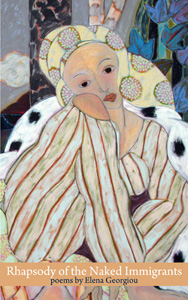Issue 2 - Winter 2010 Reviews Anxious Music Blood Dazzler Cities of Flesh and the Dead Crazy Love Cures and Poisons Dark Card and Mom's Canoe Fire Pond How to Live on Bread and Music Mister Skylight Paternity Perpetual Care Pictures in the Firestorm Rhapsody of the Naked Immigrants Rock Vein Sky Six Lips Slaves to Do These Things Slide Shows The Air around the Butterfly The Guilt Gene the nested object Interviews
 |
Elena Georgiou’s first collection of poems, Mercy Mercy Me, introduced her poetic voice to readers through a willingness to experiment with line length and poem patterns and a speaker who engages in self-doubt and second-guessing while courageously moving toward assertion and understanding. A good number of those poems also deal with the literal and figurative aspects of transporting a person from one place to another, the restlessness and the settling-in of a body and soul in transit. Her new collection, Rhapsody of the Naked Immigrants, unfolds poem by poem as an intimate and believable set of portrait-like pieces that attempt to communicate the immigrant experience to the reader. The poems’ images and sentences track the inevitable trek from homeland to new-homeland and do justice to the awe and disorientation in which a newcomer to New York City finds herself immersed.
The strongest poems here compel the reader to partake in the daily lives of people who are displaced; whether forced from their homelands or seeking new homes in a place perceived as “better,” these characters shuttle through subways, eat at diners, and ponder the losses of family, childhood places, necklaces, languages, lovers. They are never certain where home is. Music, prayer, and travel are concatenations that draw the reader toward more abstract themes such as compassion and love, from the “Freedom” in the initial poem to the closing poem’s plea:
The very titles of Georgiou’s poems include these “screams”: there are psalms, aubades, an elegy, nocturne, prayer, rhapsody, praisesong. Popular music weaves in and out of the poems, especially in the section called Mass in Transit, which consists mostly of a long poem, “Train,” in three parts, in which the speaker seems almost a diarist and which together comprise one of the best descriptions of taking New York subways I can think of. Reviewed by Ann E. Michael. |
